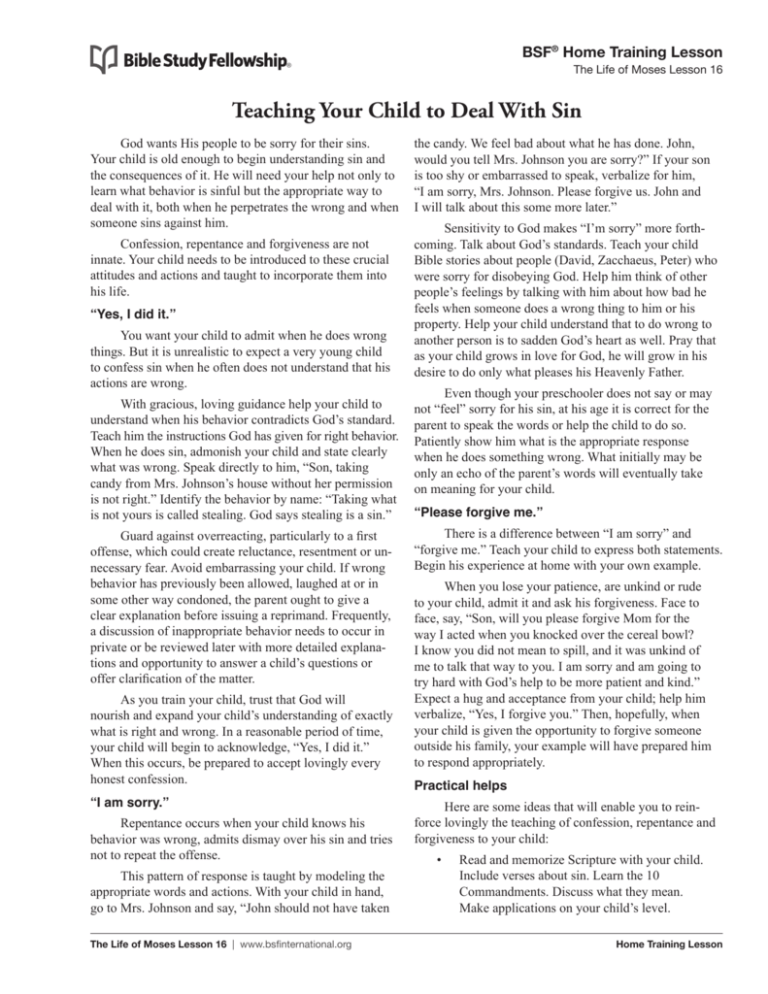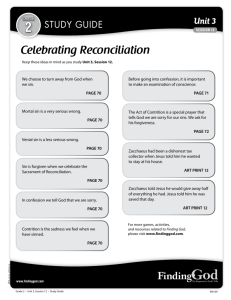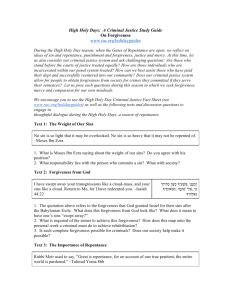Teaching Your Child to Deal With Sin
advertisement

BSF® Home Training Lesson ® The Life of Moses Lesson 16 Teaching Your Child to Deal With Sin God wants His people to be sorry for their sins. Your child is old enough to begin understanding sin and the consequences of it. He will need your help not only to learn what behavior is sinful but the appropriate way to deal with it, both when he perpetrates the wrong and when someone sins against him. Confession, repentance and forgiveness are not innate. Your child needs to be introduced to these crucial attitudes and actions and taught to incorporate them into his life. “Yes, I did it.” You want your child to admit when he does wrong things. But it is unrealistic to expect a very young child to confess sin when he often does not understand that his actions are wrong. With gracious, loving guidance help your child to understand when his behavior contradicts God’s standard. Teach him the instructions God has given for right behavior. When he does sin, admonish your child and state clearly what was wrong. Speak directly to him, “Son, taking candy from Mrs. Johnson’s house without her permission is not right.” Identify the behavior by name: “Taking what is not yours is called stealing. God says stealing is a sin.” Guard against overreacting, particularly to a first offense, which could create reluctance, resentment or unnecessary fear. Avoid embarrassing your child. If wrong behavior has previously been allowed, laughed at or in some other way condoned, the parent ought to give a clear explanation before issuing a reprimand. Frequently, a discussion of inappropriate behavior needs to occur in private or be reviewed later with more detailed explanations and opportunity to answer a child’s questions or offer clarification of the matter. As you train your child, trust that God will nourish and expand your child’s understanding of exactly what is right and wrong. In a reasonable period of time, your child will begin to acknowledge, “Yes, I did it.” When this occurs, be prepared to accept lovingly every honest confession. “I am sorry.” Repentance occurs when your child knows his behavior was wrong, admits dismay over his sin and tries not to repeat the offense. This pattern of response is taught by modeling the appropriate words and actions. With your child in hand, go to Mrs. Johnson and say, “John should not have taken The Life of Moses Lesson 16 | www.bsfinternational.org the candy. We feel bad about what he has done. John, would you tell Mrs. Johnson you are sorry?” If your son is too shy or embarrassed to speak, verbalize for him, “I am sorry, Mrs. Johnson. Please forgive us. John and I will talk about this some more later.” Sensitivity to God makes “I’m sorry” more forthcoming. Talk about God’s standards. Teach your child Bible stories about people (David, Zacchaeus, Peter) who were sorry for disobeying God. Help him think of other people’s feelings by talking with him about how bad he feels when someone does a wrong thing to him or his property. Help your child understand that to do wrong to another person is to sadden God’s heart as well. Pray that as your child grows in love for God, he will grow in his desire to do only what pleases his Heavenly Father. Even though your preschooler does not say or may not “feel” sorry for his sin, at his age it is correct for the parent to speak the words or help the child to do so. Patiently show him what is the appropriate response when he does something wrong. What initially may be only an echo of the parent’s words will eventually take on meaning for your child. “Please forgive me.” There is a difference between “I am sorry” and “forgive me.” Teach your child to express both statements. Begin his experience at home with your own example. When you lose your patience, are unkind or rude to your child, admit it and ask his forgiveness. Face to face, say, “Son, will you please forgive Mom for the way I acted when you knocked over the cereal bowl? I know you did not mean to spill, and it was unkind of me to talk that way to you. I am sorry and am going to try hard with God’s help to be more patient and kind.” Expect a hug and acceptance from your child; help him verbalize, “Yes, I forgive you.” Then, hopefully, when your child is given the opportunity to forgive someone outside his family, your example will have prepared him to respond appropriately. Practical helps Here are some ideas that will enable you to reinforce lovingly the teaching of confession, repentance and forgiveness to your child: • Read and memorize Scripture with your child. Include verses about sin. Learn the 10 Commandments. Discuss what they mean. Make applications on your child’s level. Home Training Lesson • Commend right behavior. Notice when your child overcomes temptation and give him praise. Call attention to behavior that is Christlike. Reward a forgiving spirit. • Deal promptly with each day’s behavior. Introduce confession and repentance as part of evening prayer time. Teach your child how to ask forgiveness from friends, family and from God. • Use the designation of “sin” with care. Help your child understand what behavior is sin. A sincere and honest childish mistake may be inappropriate, but it is hardly sin. Inappropriate behavior can result from many causes that have no root in defiance or willful disobedience. (Wearing mismatched socks may be wrong but it is not sin.) • Model right behavior. Be forgiving. A child notices how Mom or Dad deals with sin. Ask forgiveness. Acknowledge consequences. • Evaluate your initial and instinctive response to a child’s wrong actions. An adult who has strongly unpleasant and harsh reactions may begin seeing a child defend himself by lying or refusing to admit his wrong. Remember it takes courage to admit wrongdoing; be appreciative of this. • • Refrain from calling your child “bad” when he misbehaves. God’s creations are good although their behavior frequently is not. Identify the behavior as bad, but not the child himself. Agree with your spouse on the action and words to be taught your child when he sins. Discuss consequences and punishment. Consistency is important. To learn and practice confession, repentance and forgiveness requires humility of spirit. May this trait of the Lord Jesus develop and thrive in you and your child. Home Training Lesson www.bsfinternational.org | The Life of Moses Lesson 16

